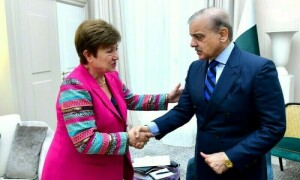IT is now becoming increasingly evident that the Western alliance is gearing up for a direct confrontation with Russia. The recent announcements by major Western leaders, including those from the United States, the United Kingdom, Germany and France, have signalled the approval for Nato weapons to be used in strikes deep within Russia. This move marks a significant escalation in the ongoing conflict, whose end remains uncertain. Are there going to be impli- cations for Pakistan in the emerging scenario? Apparently, yes.
A particularly concerning development in the conflict zone is the unprecedented attack on Russian nuclear radar stations by Ukrainian forces. Renowned scholars of nuclear strategy, such as Albert and Roberta Wohlstetter, Herman Kahn and Paul Nitze, have long warned against bringing matters close to the nuclear threshold, cautioning that such actions could lead to unpredictable and potentially catastrophic outcomes.
With these recent deep strikes inside Russia, we may be witnessing a new phase of the conflict. As such, the timeline of events includes Russia’s removal from the Society for Worldwide Interbank Financial Telecommunication (SWIFT) system, effectively cutting it off from the global financial network.
This was followed by the US announ- cement to seize Russian US treasury assets and further encouragement to confiscate over $200 billion held by the Belgian clearing house Euroclear. The US has already seized $5 billion and is urging European allies to do the same. Euroclear, which settled transactions worth 992 trillion euros in 2021 and held 37.6 trillion euros in assets by the end of that year, could face legal challenges from Russia, potentially in Hong Kong’s jurisdiction. Such moves are likely to cause significant disruptions in global finance.
The upcoming G7 meeting is highly anticipated, with the world waiting to see what course of action the Western powers will take. Discussions about military drafting and conscription are already underway, with the Conservative Party in Britain proposing the reintroduction of mandatory National Service, and Germany considering conscription for all those aged 18 and above.
In this rather grim scenario, let us see what are the possible implications for Pakistan. No doubt, these escalating global tensions pose serious risks. As the geopolitical landscape intensifies, Pakistan’s economic stability is at stake. The threat is more potent than many would like to believe or concede. The country, already burdened with substantial debt, cannot afford another major disruption in trade and commerce similar to the one that was experienced during the Covid pandemic.
The current geopolitical trends are highly inflationary, putting additional pressure on Pakistan’s foreign exchange reserves and currency stability.
Pakistan must prioritise reconciliation and internal stability to avoid the dire alternative of a possible sovereign default, which would further deteriorate the living conditions and the quality of life of the people at large. The government and its various relevant agencies should focus on this critical task ahead of time.
Adil Hanif Godil
London, UK
Published in Dawn, June 6th, 2024












































Dear visitor, the comments section is undergoing an overhaul and will return soon.